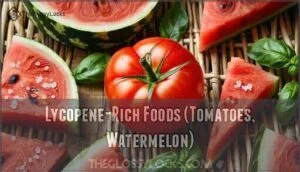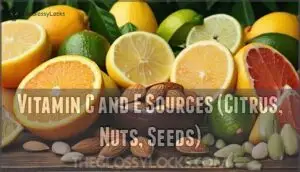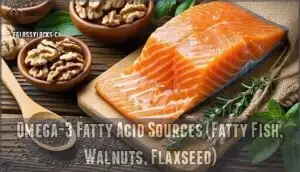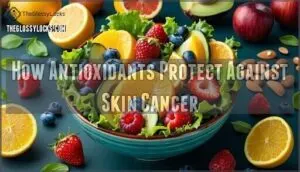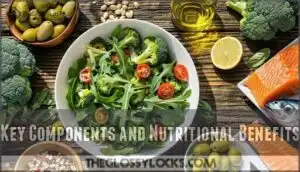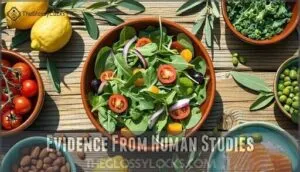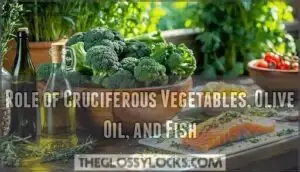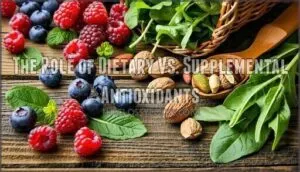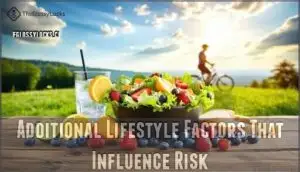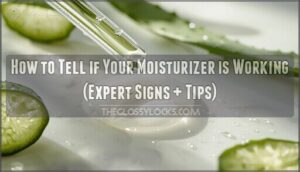This site is supported by our readers. We may earn a commission, at no cost to you, if you purchase through links.
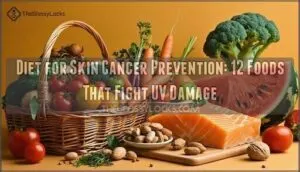
Fill your shopping cart with beta-carotene-rich carrots and sweet potatoes, lycopene-packed tomatoes and watermelon, and omega-3 powerhouses like fatty fish and walnuts. The Mediterranean diet’s winning combination of these protective compounds has proven particularly effective in large studies.
Skip the supplements though—whole foods deliver these nutrients alongside other protective compounds that work together like a well-orchestrated defense team.
Table Of Contents
Key Takeaways
- You can reduce your skin cancer risk by up to 17% by filling your plate with antioxidant-rich foods like carrots, sweet potatoes, tomatoes, fatty fish, and green tea that neutralize harmful UV-induced free radicals.
- You’ll get better protection from whole foods than supplements since they deliver antioxidants alongside other protective compounds, while high-dose supplements may actually increase cancer risk.
- You should follow Mediterranean diet patterns emphasizing cruciferous vegetables, olive oil, and omega-3 rich fish, which research shows can cut melanoma risk in half.
- You need to maintain proper fatty acid balance by choosing omega-3 sources over processed foods high in omega-6s, while limiting alcohol consumption that increases oxidative stress and skin damage.
Top Antioxidant-Rich Foods for Skin Health
Your diet can serve as your skin’s first line of defense against harmful UV rays that cause cancer. Research shows that foods packed with antioxidants like beta-carotene, lycopene, and vitamins C and E help neutralize the free radicals that damage your skin cells and increase cancer risk.
Beta-Carotene Sources (Carrots, Sweet Potatoes)
Nature’s vibrant orange and yellow vegetables pack powerful carrot benefits and sweet potato antioxidants that shield your skin from within. Beta carotene in these colorful carotenoids converts to vitamin A, helping repair UV-damaged cells.
Orange fruits and yellow vegetables like carrots deliver concentrated antioxidant rich foods for natural UV damage reduction protection.
Lycopene-Rich Foods (Tomatoes, Watermelon)
That bright red tomato on your counter isn’t just for salads—it’s packed with lycopene, a powerful antioxidant that shields your skin from UV damage. Watermelon juice delivers similar lycopene benefits while keeping you hydrated.
These antioxidant-rich foods boost your body’s natural defenses against skin cancer. Regular fruit consumption provides dietary antioxidants that work from within, offering protective antioxidant properties that complement your sunscreen routine.
Vitamin C and E Sources (Citrus, Nuts, Seeds)
Citrus fruits pack a serious vitamin C punch for your skin’s defense system. Oranges, strawberries, and kiwi deliver dietary antioxidants that repair damaged cells after UV exposure. Meanwhile, nuts and seeds provide vitamin E through natural seed oils. Almonds and sunflower seeds offer antioxidant richness without needing vitamin supplements.
These nutrient benefits work together, giving your healthy diet real protective power against free radical damage. Incorporating foods that fight skin aging, such as those rich in antioxidant dense nutrients, can boost the overall effectiveness of your diet in preventing skin damage.
Omega-3 Fatty Acid Sources (Fatty Fish, Walnuts, Flaxseed)
Think of omega-3 fatty acids as your skin’s bodyguards against UV damage. These powerful cancer-fighting foods work by maintaining proper fatty acid balance, reducing inflammation that leads to skin cancer. Research shows omega-3s inhibit UV-induced cancer development while omega-6s may increase risk. Understanding the role of fatty acid balance is essential for effective skin cancer prevention.
Top omega-3 sources include:
- Fatty fish benefits: salmon, sardines, mackerel (twice weekly)
- Walnuts nutrition: quarter-cup daily provides plant-based omega-3s
- Flaxseed oil: one tablespoon ground seeds promotes antioxidants naturally
- Chia seeds: easy addition to smoothies for healthy diet benefits
- Consider omega-3 supplements if you don’t eat fish regularly
Polyphenol-Rich Teas (Green and Black Tea)
Both Green Tea and Black Tea compounds serve as powerful shields against oxidative stress. These polyphenols are considered photoprotective agents due to their antioxidant, anti-inflammatory, and anti-carcinogenic properties. Herbal infusions deliver concentrated antioxidants that boost DNA repair in damaged skin cells. The polyphenols found in tea have been shown to have UVB protective effects that can help prevent skin cancer.
| Tea Type | Key Compounds | Daily Serving |
|---|---|---|
| Green Tea | EGCG, epicatechins | 2-3 cups |
| Black Tea | Theaflavins, tannins | 1-2 cups |
| White Tea | Catechins, polyphenols | 1-2 cups |
| Oolong Tea | Mixed polyphenols | 2 cups |
How Antioxidants Protect Against Skin Cancer
When UV rays hit your skin, they create harmful free radicals that damage your cells and DNA, potentially leading to skin cancer.
Your body can’t make antioxidants on its own, so you’ll need to get these protective compounds from food to neutralize free radicals and reduce inflammation before it turns into cancer.
Combating Oxidative Stress and Free Radical Damage
Your body’s constant battle against free radicals becomes critical when UV rays hit your skin. These unstable molecules trigger oxidative stress, damaging cellular structures and DNA.
An antioxidant-rich diet provides cellular protection by neutralizing free radicals before they cause harm. This antioxidant therapy creates oxidative balance, giving your skin’s natural defense system the tools for effective free radical control and stress reduction.
Reducing UV-Induced Inflammation
When UV rays hit your skin, they trigger inflammatory cascades that can lead to cellular damage and cancer development. Antioxidants act like your body’s firefighters, dousing UV-induced inflammation before it spreads. Here’s how dietary antioxidants provide cellular defense:
- Omega-3 fatty acids reduce inflammatory markers and boost UV protection
- Polyphenols from green tea calm oxidative stress responses
- Vitamin E shields cell membranes from UV-related skin inflammation
Supporting DNA Repair in Skin Cells
After UV damage, your cells need repair mechanisms to prevent malignant transformation. Antioxidant therapy aids DNA restoration through cellular regeneration processes. Vitamin E and selenium promote molecular healing, while omega-3 fatty acids and polyphenols assist skin renewal at the genetic level.
| Nutrient | DNA Repair Action | Food Sources |
|---|---|---|
| Vitamin E | Protects cell membranes | Almonds, sunflower seeds |
| Selenium | Activates repair enzymes | Brazil nuts, tuna |
| Omega-3s | Reduces DNA fragmentation | Salmon, walnuts |
| Polyphenols | Prevents oxidative damage | Green tea, berries |
Boosting Internal Sun Protection
Your body naturally creates antioxidant protection, but an antioxidant-rich diet substantially boosts internal sun protection against UV-related skin inflammation. While sunscreen alternatives aren’t enough alone, antioxidants help:
- Strengthen skin microbiome defenses against oxidative stress
- Prevent nutrient deficiencies that weaken UV resistance
- Boost antioxidant supplements effectiveness through dietary fiber
- Build antioxidant reserves in skin cells before sun exposure
- Support long-term antioxidant protection beyond topical applications
The Mediterranean Diet and Skin Cancer Prevention
You’ll find the Mediterranean diet’s rich blend of antioxidant-packed foods offers proven protection against skin cancer development.
Research from Italy shows that following this eating pattern can cut your melanoma risk in half, thanks to its emphasis on cruciferous vegetables, olive oil, and omega-3-rich fish.
Key Components and Nutritional Benefits
Mediterranean dietary patterns offer powerful antioxidant benefits through nutrient balance that promotes skin health. You’ll find cancer prevention advantages in this approach’s emphasis on antioxidants like vitamin E, omega-3 fatty acids, and polyphenols from cancer-fighting foods.
| Food Category | Key Nutrients | Skin Protection |
|---|---|---|
| Cruciferous Vegetables | Sulforaphane, Vitamin C | DNA repair support |
| Olive Oil | Vitamin E, Phenolic compounds | Anti-inflammatory effects |
| Fatty Fish | Omega-3s, Selenium | UV damage reduction |
| Fresh Herbs | Polyphenols, Flavonoids | Free radical neutralization |
Evidence From Human Studies
Large-scale clinical research provides compelling evidence for Mediterranean diet benefits. Human trials involving nearly 99,000 French women showed 17% lower skin cancer rates among those following Mediterranean eating patterns.
Epidemiology studies reveal this dietary intake reduces melanoma and basal cell carcinoma risk, though squamous cell protection remains unclear. These prevention strategies outperform antioxidant supplements in human studies.
Role of Cruciferous Vegetables, Olive Oil, and Fish
Three powerhouse foods anchor the Mediterranean approach to skin protection. Cruciferous vegetables like broccoli and kale deliver vegetable antioxidants that neutralize UV damage. Olive oil provides healthy fats that reduce inflammation while supporting skin barrier function. Fatty fish supplies omega-3 fatty acids that help repair damaged DNA and boost your body’s natural defenses against harmful rays.
Incorporating foods that help hydrate skin, such as those rich in skin hydrating nutrients, can further augment the Mediterranean diet’s benefits for skin health.
The Role of Dietary Vs. Supplemental Antioxidants
You’ll get more protection from eating antioxidant-rich foods than popping supplements, and recent research shows why this matters for your skin’s defense against cancer.
While whole foods deliver antioxidants alongside other protective compounds, supplements can actually backfire and may increase cancer spread in some cases.
Benefits of Whole Foods Over Supplements
Getting your antioxidants from whole foods beats popping supplements. Natural antioxidants in fruits and vegetables work synergistically with phytonutrients and fiber.
| Aspect | Whole Foods | Supplements |
|---|---|---|
| Absorption | Higher bioavailability | Limited absorption |
| Safety | Naturally balanced | Risk of overdose |
| Cost | Budget-friendly | Expensive |
| Nutrients | Complete packages | Isolated compounds |
| Research | Consistent benefits | Mixed results |
Your healthy eating habits deliver dietary balance naturally. Supplement risks include interference with medications and masking poor nutrition.
Risks of Excessive Antioxidant Supplementation
Taking antioxidant supplements sounds healthy, but overdoing it creates antioxidant toxicity that disrupts your body’s oxidative balance. High-dose supplements can increase cancer metastasis risk and cellular damage rather than preventing it. Your body needs some free radicals for normal immune function—too many antioxidants interfere with this delicate system.
| Supplement Risk | Potential Effect | Better Alternative |
|---|---|---|
| Vitamin E excess | Increased bleeding risk | Sunflower seeds, almonds |
| Beta-carotene overload | Lung cancer in smokers | Orange vegetables |
| High-dose vitamin C | Kidney stones | Citrus fruits, berries |
What Research Says About Supplements and Skin Cancer
Research findings on antioxidant supplements paint a complex picture. Most clinical trials show disappointing results for traditional antioxidants like Vitamin E and beta-carotene, with some research suggesting potential cancer risk increases. However, folate shows promise with a 12% melanoma risk reduction, while nicotinamide demonstrates significant benefits.
| Supplement | Research Findings | Cancer Risk |
|---|---|---|
| Nicotinamide | 14-54% risk reduction | Lower |
| Folate | 12% melanoma reduction | Lower |
| Vitamin E/Beta-carotene | No protection found | Potentially higher |
Omega-3 fatty acids show mixed results, while dietary intake of antioxidants consistently outperforms supplements. The research suggests supplement safety depends heavily on vitamin dosage and timing.
Before starting any antioxidant benefits regimen, consult your doctor about appropriate supplement safety protocols. Understanding the importance of natural skin care benefits can also play a vital role in overall skin health and cancer prevention.
Additional Lifestyle Factors That Influence Risk
While choosing the right foods matters, you’ll also need to take into account how other lifestyle choices affect your skin cancer risk.
Your drinking habits and the types of fats you consume can either help protect your skin or make it more vulnerable to UV damage.
Impact of Alcohol Consumption
Your daily glass of wine might seem harmless, but Alcohol Effects on Cancer Risk tell a different story. Studies link heavy drinking to increased Skin Damage through Oxidative Stress and Free Radicals. White wine shows particularly concerning connections to melanoma risk.
Consider Alcohol Alternatives like antioxidant-rich teas to support your body’s natural Cancer Fighting Foods arsenal and protect your skin. Understanding the effects of alcohol on hair can also provide insight into its broader impact on overall health.
Omega-6 Fatty Acids and Processed Foods
Balance matters in the context of fatty acid intake. Your body needs omega-6 fatty acids, but processed foods flood your system with excess amounts that trigger inflammatory effects and oxidative stress.
This imbalance disrupts your natural antioxidant defenses, creating more free radicals that damage skin cells.
Practice dietary moderation by choosing whole foods over packaged snacks to maintain proper omega-3 fatty acids ratios.
Practical Tips for a Skin-Protective Diet
Building an antioxidant-rich diet doesn’t require complicated meal prep or expensive ingredients. Start a food diary to track your dietary intake of colorful whole foods. Focus on simple healthy recipes featuring tomatoes, leafy greens, and fatty fish.
Plan meals around phytonutrients from seasonal produce. Remember, consistent nutrition advice emphasizes variety over quality – your skin will thank you. Incorporating antioxidant rich foods into your diet can have numerous health benefits.
Frequently Asked Questions (FAQs)
Can dietary changes completely replace sunscreen protection?
Dietary changes can’t replace sunscreen protection. You’ll still need broad-spectrum SPF 15+ daily.
Think of antioxidant-rich foods as your backup dancers—they support your skin’s defenses but sunscreen remains the star performer.
How long before diet changes affect cancer risk?
Rome wasn’t built in a day, and neither is cancer protection. You’ll need at least 2-3 years of consistent healthy eating to see meaningful changes in your cancer risk, though benefits begin accumulating immediately.
Are there specific foods that increase cancer risk?
Yes, certain foods can increase your cancer risk. Processed meats, excessive alcohol, and foods high in omega-6 fatty acids like many processed items raise skin cancer risk specifically.
Whats the recommended daily antioxidant intake amount?
While science loves precise numbers, antioxidant recommendations aren’t one-size-fits-all. Adults need 75-90mg vitamin C daily, 15mg vitamin E, and 55mcg selenium. Skip supplements—food wins.
Do cooking methods affect antioxidant levels significantly?
Cooking methods absolutely impact antioxidant levels. Boiling can destroy 80% of health benefits in polyphenol-rich foods, while griddling and microwaving maintain the highest antioxidant levels.
Conclusion
Building better barriers against skin damage starts with smart food choices. Your diet for skin cancer prevention doesn’t replace sunscreen, but it creates powerful internal protection.
Research shows consistent consumption of antioxidant-rich foods can reduce your cancer risk substantially. Focus on colorful vegetables, fatty fish, and green tea while limiting processed foods.
These dietary changes work alongside traditional sun protection methods, giving you thorough defense against UV damage and supporting long-term skin health.
- https://pmc.ncbi.nlm.nih.gov/articles/PMC4637095/
- https://www.skincarenetwork.co.uk/skin-cancer-treatment/diet/
- https://www.sciencedirect.com/science/article/abs/pii/S1568163720302622
- https://www.dermatologytimes.com/view/fat-intake-linked-skin-cancer-risk
- https://healthcare.utah.edu/healthfeed/2016/12/alcohol-and-melanoma-new-link


